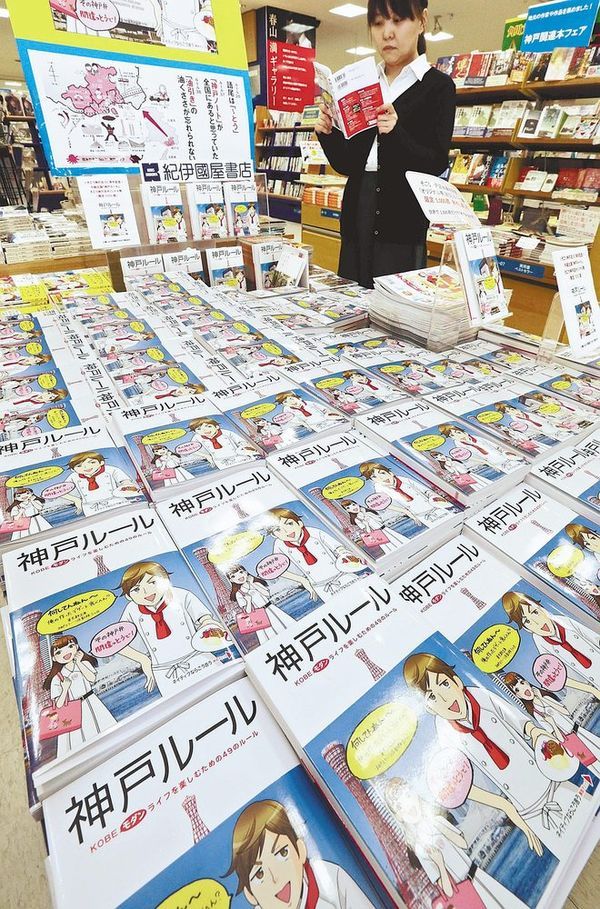“When you see a comedian, you should talk to them or follow them.” (Osaka)
“Always call fried tofu ‘oage-san,’ not ‘aburaage.’” (Kyoto)
“When you run into a wild boar, you must not show surprise.” (Kobe)
These are a few of the regional “rules” introduced in books published by Tokyo-based Chukei Publishing Co.
The firm, which mainly deals in business and academic books, has published 10 volumes on such rules, from the initial Tokyo version to the latest Kobe version, selling about 226,000 copies overall.
According to the company, each book sells well in the area on which it focuses. Experts say the brisk sales are perhaps due to the fact that many people want to reaffirm their relationships with their hometown communities.
The first book was planned in 2005 and published in 2006. The concept was inspired by discussions among Chukei employees about the various differences in local dialects and customs of their hometowns.
Freelance writer Reiko Osawa, 44, from Makurazaki, Kagoshima prefecture, travels nationwide to collect and write the stories.
“Always call fried tofu ‘oage-san,’ not ‘aburaage.’” (Kyoto)
“When you run into a wild boar, you must not show surprise.” (Kobe)
These are a few of the regional “rules” introduced in books published by Tokyo-based Chukei Publishing Co.
The firm, which mainly deals in business and academic books, has published 10 volumes on such rules, from the initial Tokyo version to the latest Kobe version, selling about 226,000 copies overall.
According to the company, each book sells well in the area on which it focuses. Experts say the brisk sales are perhaps due to the fact that many people want to reaffirm their relationships with their hometown communities.
The first book was planned in 2005 and published in 2006. The concept was inspired by discussions among Chukei employees about the various differences in local dialects and customs of their hometowns.
Freelance writer Reiko Osawa, 44, from Makurazaki, Kagoshima prefecture, travels nationwide to collect and write the stories.

At first, she collects information at local restaurants and other public places from the people of the featured prefecture. Then she interviews about 50 residents, asking such questions as “What do you have in your refrigerator?” and “What do you like most in your school lunch?” When patterns emerge in the responses, Osawa records them as “rules.”
About 50 such guidelines are introduced in each issue of the books, accompanied by explanations and analysis from Osawa.
For example, “People from Osaka consider it natural to openly ask others the price of a personal item,” and “They make efforts from childhood to become ‘an amusing person who can make others laugh.’”
On the other hand, “People from Kyoto are not considered sophisticated adults until they can skillfully repay a perceived wrong done to them in the same nasty manner.”
Also from the Kyoto version: “People in Kyoto have a strong pride in their city, rather than in the Kansai region.” However, “They are less well versed in the tourist spots in Kyoto than outsiders might expect.”
Meanwhile, “Kobe people are fashionable and like shops with a good atmosphere known to only a small number of people that are not highly publicized in the mass media.” But, “(As Kobe is a mountainous area), they get lost when they go to a place without mountains.”
From the Tokyo version: “Tokyoites avoid the Hachiko dog statue at Shibuya Station as a meeting place.” In contrast to people from Osaka, “Tokyo people pretend not to notice a comedian when they bump into one in the street.”
Sales of the Tokyo books stand at 12,000 copies, but the Osaka version has sold 37,000. Due to the popularity in Osaka, another special version, “Osaka Okan Rules,” which features the candid speaking style of middle-aged women in Osaka, was also published.
The Kobe version topped the weekly best-selling list at Kaibundo bookstore in Kobe immediately after it was published in February, and stayed within the shop’s top-10 ranking for 11 consecutive weeks.
“It’s important to include some details that will trigger people’s love for their local communities, and others that afford a third party a chance to gently mock the area ― something funny and strange,” Osawa said.
Norifumi Kawahara, a professor of historical geography at Ritsumeikan University, said: “When human relationships become tenuous, sharing such hometown customs leads to a strengthened sense of unity and safety.
“In the past, people felt that their regional cultures and dialects were a source of shame, but now, openly discussing them can be an expression of love for one’s hometown community.”
(The Japan News)
-
Articles by Korea Herald







![[Graphic News] More Koreans say they plan long-distance trips this year](http://res.heraldm.com/phpwas/restmb_idxmake.php?idx=644&simg=/content/image/2024/04/17/20240417050828_0.gif&u=)
![[KH Explains] Hyundai's full hybrid edge to pay off amid slow transition to pure EVs](http://res.heraldm.com/phpwas/restmb_idxmake.php?idx=644&simg=/content/image/2024/04/18/20240418050645_0.jpg&u=20240419100350)






![[From the Scene] Monks, Buddhists hail return of remains of Buddhas](http://res.heraldm.com/phpwas/restmb_idxmake.php?idx=652&simg=/content/image/2024/04/19/20240419050617_0.jpg&u=20240419175937)

![[KH Explains] Hyundai's full hybrid edge to pay off amid slow transition to pure EVs](http://res.heraldm.com/phpwas/restmb_idxmake.php?idx=652&simg=/content/image/2024/04/18/20240418050645_0.jpg&u=20240419100350)

![[Today’s K-pop] Illit drops debut single remix](http://res.heraldm.com/phpwas/restmb_idxmake.php?idx=642&simg=/content/image/2024/04/19/20240419050612_0.jpg&u=)